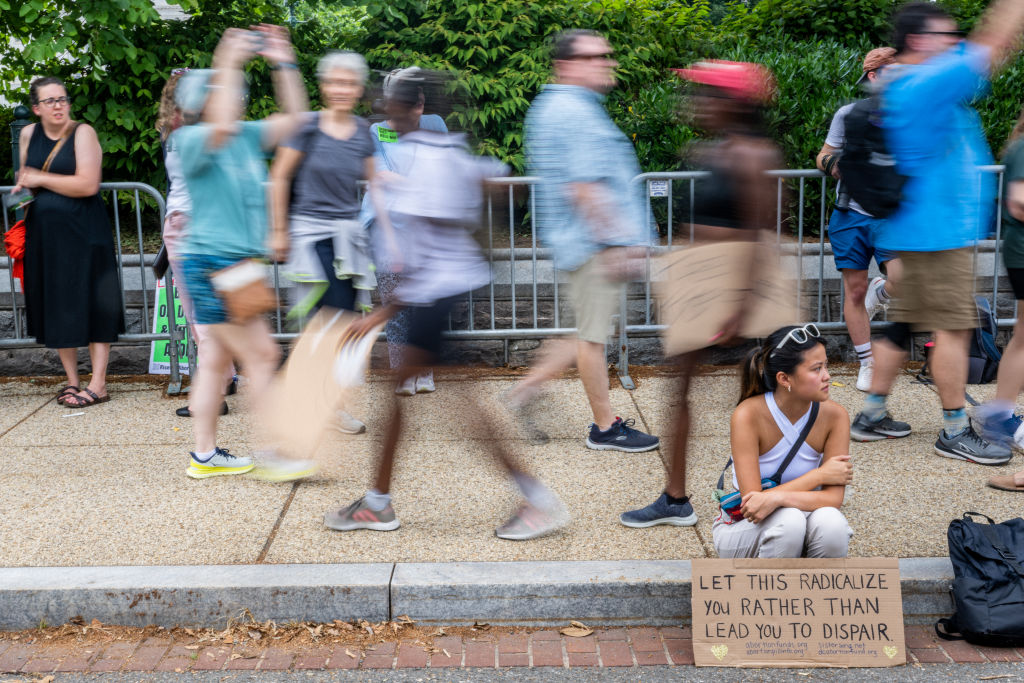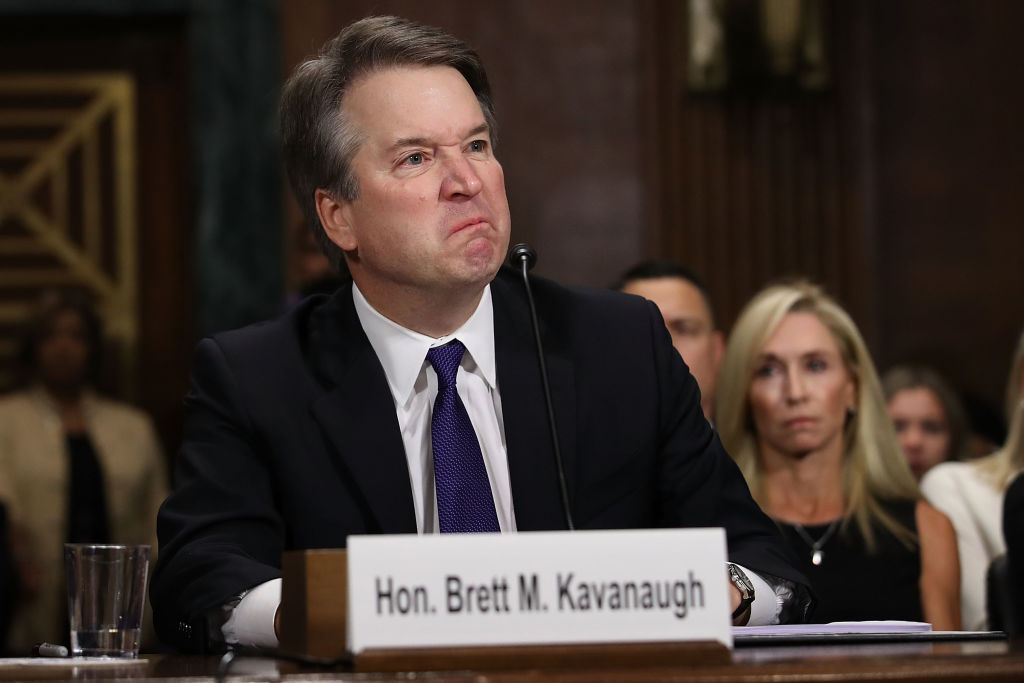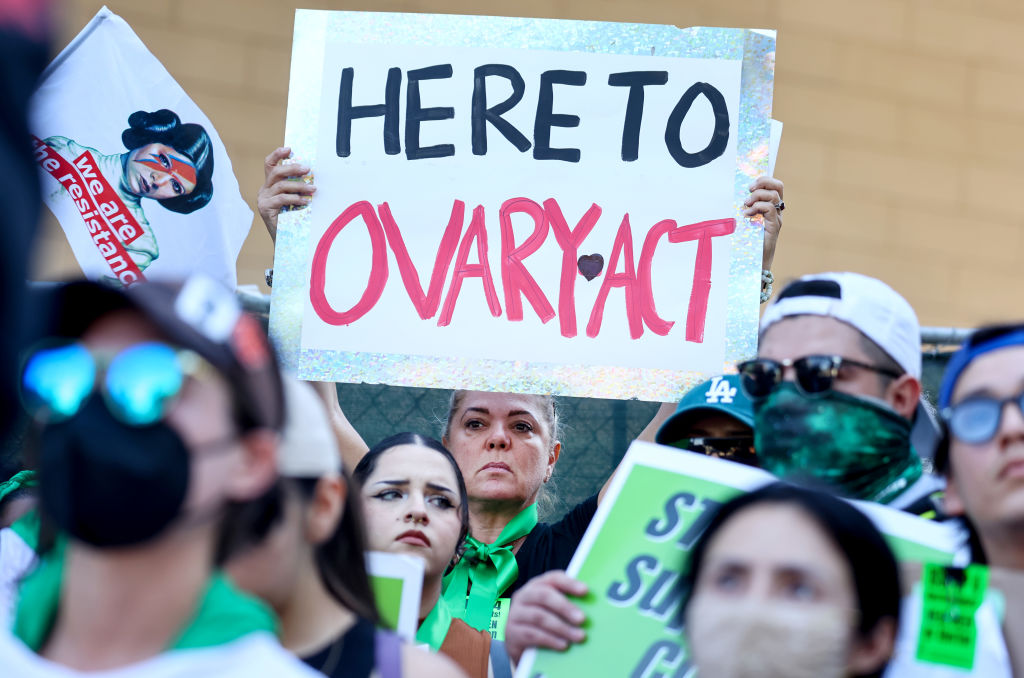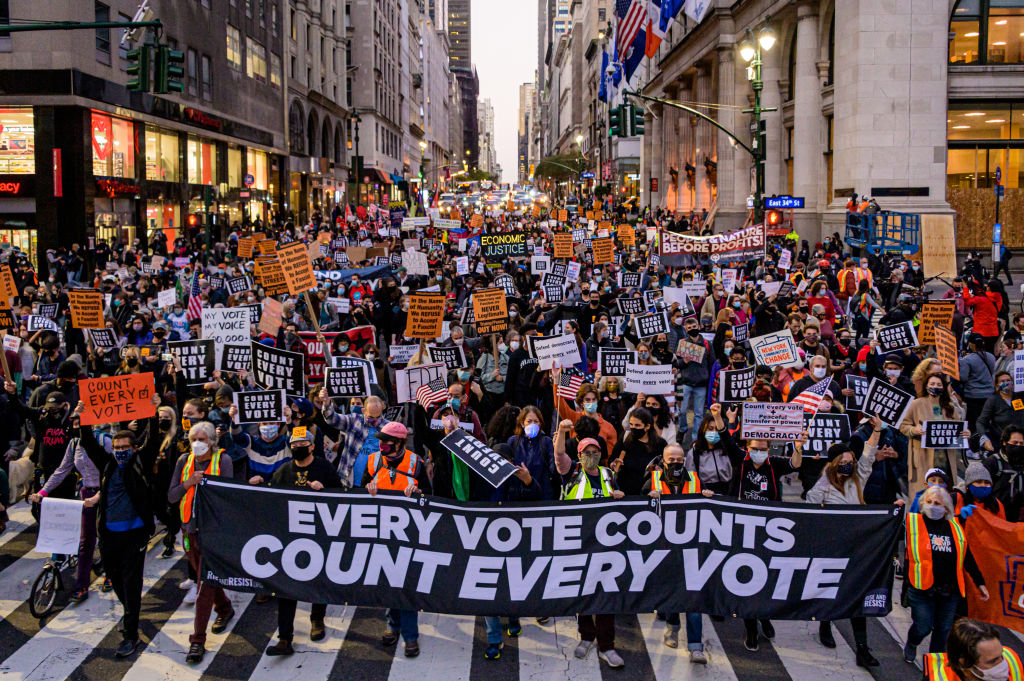THE FIRST WEEK WITHOUT ROE V. WADE
BY CINDI LEIVE
A lot of people were shocked by the Supreme Court’s decision to overturn Roe v. Wade last week. You saw it everywhere: OhmyGodhowcanthisbehappening?? And it was understandable: Even though Roe had been eroded mercilessly for years, dying gradually before it died suddenly, that sudden death was still startling.
But not for many organizers and legal scholars, and not for Dahlia Lithwick. Three years ago, she broke down for me over breakfast exactly what was coming for Roe (most terrifying scrambled egg meal ever). And she’s also been cautioning that the Court planned to do exactly this in her columns covering the law for Slate and on her podcast Amicus.
But she’s also someone who’s often made me feel hopeful—about change, and what our courts can do at their best. For this week’s newsletter, I asked her to talk to The Meteor about where we are seven days after this momentous decision, and what the road looks like from here.

Cindi Leive: It’s been a week—which feels like a century—since the decision. What, if anything, do you feel like you’re realizing now that may not have been immediately apparent at the very beginning?
Dahlia Lithwick: What I’m realizing is the sprawling extent of the chaos. [Before the decision], we all saw those infographics—these states have trigger laws; these have preexisting zombie laws—and it looked like you’d pull a switch and that in some states, abortion would be legal, and in other states, it wouldn’t. And of course, what we’re learning is that nothing is that simple. And that in some states they are not giving plan B and in some states, they’re turning people away from the E.R. who are having routine miscarriages…There’s an infinite number of hellish possibilities in every jurisdiction. And for me, the shock is that even though I knew it would be a mishmash and a hodgepodge, [there’s] a catastrophic sprawl of uncertainty, and a chilling effect on everyone, that I just am only beginning to appreciate.
Leive: How long do you think that catastrophic sprawl of uncertainty lasts?
Lithwick: The landscape will become clearer. But I also think the lack of clarity is the point, because the point here is to have everything look like it’s on the margins, and everyone be terrified. And if you feel as though the mere act of dispensing advice is going to [get you in trouble], particularly in jurisdictions that are doing these vigilante SB8 laws that are enforced by your neighbor who’s trying to collect the bounty… the whole point is to make everybody afraid. And the more confusion and uncertainty there is, ultimately, the fewer services there are, regardless of the law in any specific place. And I think that’s very much a feature, not a bug, in this incredibly sweeping, draconian way.
Leive: Before we get deeper into what’s happening right now, I want go back into how your own view of the court has changed. You wrote in 2019 that you had chosen not to go back to the Supreme Court after Brett Kavanaugh’s confirmation hearings—that those hearings [and the failure to investigate assault charges against him] were a turning point for you as a reporter. What changed then, and what’s changed from then to now?
Lithwick: I think of [2019] as, like halcyon days compared to today. [Then], I was just making a determination for myself, a moral, ethical determination that I couldn’t use the imprimatur of my name and my work to legitimize a seat that I thought was obtained through lying and through a very flawed [confirmation] process. You can’t be a journalist who covers that process in all its intolerable injustice, and then just the next day be like, ‘Cool, now I’ll call him Justice Kavanaugh.’ It felt unethical to me. [Now, in 2022], it’s no longer just about the flawed process. That’s certainly part of it: You know, Donald Trump massively profited from a stolen seat that was withheld from Merrick Garland, and then Mitch McConnell subverted his own rule and slammed Amy Coney Barrett onto the court while voting had already started in an election in which Trump would lose. So two of the three seats [Trump filled on the court], not including Kavanaugh, are deeply illegitimate. But this [the wave of 2022 decisions] is kind of different.

Leive: Different in what way? I know you’ve said that what was shocking to you in Dobbs was the court’s willingness to completely jettison anything that could have made them look apolitical. Why was that chilling?
Lithwick: This really started for me in the fall when SB8, Texas’s vigilante law, sneakily went into effect overnight, at midnight on the [Supreme Court’s] shadow docket, which is the emergency docket—[it felt like] something really fundamental had changed. They essentially dropped an order in the middle of the night with very, very little doctrine and couldn’t even be bothered to have the respect of hearing the analysis and writing an opinion—they just literally exercised raw power. And to see a tenth of the childbearing population in the United States suddenly told, Roe v Wade is still good law, but in Texas, you cannot avail yourself of it—I mean, it’s just nullifying your rights. Good luck. And then in the maelstrom of response to that—when the court had these historically low 36, 37% approval ratings, massive public recriminations, and anger—the justices’ response was to blame the press. They completely decimated the legitimacy of the court in the span of a year, [and] it’s our fault because we reported on it truthfully?
For me, [it’s] a double betrayal. Part of what is so frustrating is—the conservative critics are like, you just don’t like the outcomes [of the cases]. No, I don’t like the outcomes! That’s part of it. But I don’t like living in a world in which the court is completely populated by partisans who don’t give a shit.
[And] I am not one of those people who says “Good, everybody should know it’s illegitimate.” I’m not in the burn-it-all-down camp. And I’m not in part because Sherrilyn Ifill, the former head of the NAACP Legal Defense Fund, reminded me that we don’t do well when there is no court at all. It never redounds to the benefit of women and people of color and minorities and immigrants. We’re the ones who get steamrolled first. And I’m sure you’ve heard me say this before, but once there’s no functioning court, plan B is the army, and it’s not good for women.
That said, this court is not legitimate. And to kind of continue with the charade that like, “Oh, it’s not that bad and maybe it will stop at Obergefell” [the Supreme Court ruling that guarantees same-sex marriage], I’m not prepared to lie to give this court cover…And so I just I’m sitting very, very uncomfortably on that boundary between needing the court to function—and certainly needing it to do so before 2024, when I think it will decide an election—and also knowing that the court as currently constituted is not legitimate, and if we don’t rail against it, it’s only going to get worse.
ARE OUR OTHER RIGHTS AT RISK?
Leive: I want to pull on a few threads there. You’re talking about people saying it will stop with Obergefell and maybe it won’t be that bad and maybe they won’t really go after birth control and same-sex marriage. I’ve heard that too this week. And I guess the first question is, how serious do you think those threats are? And then do you think that people in general, and the media in particular, are taking them seriously enough?
Lithwick: Look, for years, we’ve been hearing, “Oh, Roe v. Wade is good law.” Each of the three Trump nominees told us that Roe v. Wade was precedent of the court. Every time I would write a column saying, “Oh, hell no, I’m telling you right now, this is it, it’s over, that’s five votes to reverse,” and every time we were told we were hysterical. And that’s incredibly gendered: It was always women journalists who were being gaslit and told that they were overreacting and that they were crying wolf and that they were seeing shadows and ghosts everywhere that didn’t exist.

I remember the week SB8 went into law in Texas, having Michele Goodwin and Rebecca Traister on the podcast, and all three of us agreed that this meant the death knell for Roe, and having listener mail come in like, “Oh, like I need to listen to three hysterical women shrilly warning about a thing that’s never going to happen?” And I did an Intelligence Squared debate with Akhil Amar, one of the most legendary legal thinkers in the country, who insisted that none of the things that came about this term were going to come about. So—it’s fine, I have gotten accustomed to it, but I think that it’s phenomenally weird to be told that the thing is not going to happen, and then in the wake of it actually happening last week, to be told, “OK, but the next thing isn’t going to happen.” I joked to a friend of mine that this must be what Jeremiah and Isaiah felt like, where they’re like “Dude, it’s really, really, really bad,” and everyone’s like, “But not this time!” as the locusts are swarming. I’m not comparing myself and Rebecca Traister and Michele Goodwin to Jeremiah, but—
Leive: I mean, you know, in my Bible…
Lithwick: [Laughs] I’m not saying it’s biblical. I’m saying it’s science and fact and reason. And so I think when I read those key paragraphs in Dobbs, where Justice Alito is trying to say “It stops here, it doesn’t go any further,” I think his reasoning is laughable. When the same court that just told you they don’t actually have to have a principled reason for doing something, they just need six votes, when they say “We’re not going to do the next thing, trust us,” my own kind of Jeremiah-ish worldview is like, Mmm, not so much going to trust you this time.
You’d have to be catastrophically stupid to trust him after what we’ve seen this term, where gun rights, reproductive rights, religious liberty rights and the existence of the administrative state [in the EPA decision] have all been usurped in the matter of a sweep of the pen.
THE VOTER SUPPRESSION LINK

Leive: You said a few minutes ago that the Supreme Court will decide an election in 2024. Briefly explain to readers why that is.
Lithwick: So my obsession this year is trying to connect abortion rights to voting rights. And I think the best way I can say it is that if you take Justice Alito at his word when he writes in his majority opinion in Dobbs not to worry because this decision “allows women on both sides of the issue to seek to affect the legislative process,” when he very smugly says, you know, if you don’t like it, vote—to me, that’s kind of hilarious coming from one of the perpetrators of the most systematic encroachment on the right to vote that we’ve ever seen, certainly since the civil rights era. If you just look at the sort of rap sheet that Justice Alito himself carries with him—whether it’s voting in Shelby County to eviscerate part of the Voting Rights Act, whether it’s being with the conservative majority in persistently upholding partisan gerrymanders, whether it’s authoring another case that rendered almost inoperable another section of the Voting Rights Act—it’s a crackup for him to say “Vote!”
The same six people who are taking away the right to choose are engaged in a years-long project to take away the right to vote. [Especially] if you are Black, if you are a student, if you are disabled.
Leive: So they say “we’re just returning it to the states.” But they’re returning it to an essentially nondemocratic process in those states at this point.
Lithwick: Yeah. I would say the number one question I’ve had this year from reproductive rights folks and gun folks is: how is this happening? You have 75-80% of Americans who didn’t want Roe to come down, 80% of Americans who want certain kinds of gun reforms, 80% of Americans who did not want concealed carry laws to be gutted in seven of the most populous states in the country. So they ask: How does it happen? This is not what I voted for!
And the answer is both what we just said, which is that partisan gerrymanders make it absolutely certain that races are uncompetitive, that elected officials are choosing their voters rather than voters choosing their elected officials. But also, and I think this is when people’s eyes glaze over…but it’s just simply the case that five of the six conservative justices on the Supreme Court were seated by presidents who lost the popular vote [George W. Bush and Donald Trump], and ratified by a Senate that collectively represented vastly fewer [people] than the half of the Senate that voted against them. And you know, all of this was kind of blessed by a completely ridiculous Electoral College system that ensures that minority rule will persist forever into the future. And so the system is working exactly as it was designed to work at the foundation: to suppress those massive, massive majorities in order to throw power to rural agrarian states and to take power away from urban, multiracial cities. And so what we are seeing as a systems failure is a systems feature. This is what this kind of malapportioned Senate and the Electoral College and the filibuster were built to do.
Leive: I think about this all the time because I look back at my time at Glamour [where Leive served as editor-in-chief], and I published a lot of stories about abortion and was proud of that. But, you know, we didn’t cover the gerrymandering that was starting to happen in 2010, or the Shelby County Supreme Court decision in 2013, and that’s on me. And as we know, voter suppression and gerrymandering are huge parts of the reason that we’re here, [since they allow state legislatures to overrule the majority]. And so part of what I think about is—how do we channel that same determined energy that people are feeling right now about reproductive freedom around things like the Electoral College and gerrymandering and voter suppression?
Lithwick: Look, I was on the same track as you. And I thought, if we just get women to think about this sort of parochial question of, like, “my body, my choice,” it will be enough. But when I was working on [my new] book, I realized that if you care about…reproductive freedom and civil rights and all the other ways that women were assaulted in the Trump era, the only way to pick your way out is these big structural reform issues.
I was on a briefing a few weeks ago after Dobbs came down. And I had a pollster say to me, “Dahlia, women just don’t care about structural democracy reform.” And my answer was kind of like, well, then prepare to keep losing, because you can’t fix this with buying tote bags and marching. And it’s not as though there aren’t state compacts to do away with the Electoral College….It isn’t as though there aren’t efforts to [counter] gerrymandering. We don’t have to invent it! It’s all being worked on, and by amazing people, including Stacey Abrams. But that has to become absolutely the locus of organizing. And we have to learn from Black women who’ve been telling us this is how they’ve been organizing forever.
Leive: Yeah, and going back to the person who told you that women just don’t care about democracy, I mean, that’s specifically white women, right?
Lithwick: Both Professor Carol Anderson and Sherrilyn Ifill have told me this year on the podcast [that] if you thought that Roe v Wade was the law, you never lived in Mississippi. If you thought one person, one vote was the law, you never lived in Georgia. And if you lived in Alabama and wanted to get an abortion after Hyde [the provision which bars the use of federal funds for most abortions], it was almost as unreachable to you then as it is now. And so many of these things that we think are these immutable rights are not—they’re paper rights. And white people benefited from them and white women definitely benefited from them.
But just because you benefited from the system doesn’t mean the system worked. And Carol Anderson always reminds me—she’s like, strap on your fanny pack, bring your battery charger, bring some water and be prepared to stand in line for 6 hours. Because that’s how Black people voted in Georgia in my whole life.
WHAT WE DO NOW

Leive: You know, you used to use this analogy that I loved, about the Yellowstone Park rule. Someone asked you if it was worthwhile to protest about an issue the Supreme Court was going to rule on and you said hell yeah. You said that it was like if you see a bear in the forest, you’re supposed to draw yourself up to your full height and try to look bigger than the bear; people should be going out to protest and be visible, ’cause the Supreme Court does actually care what people think, and we’ve got to be bigger than the bear. And now, I mean, here we are. And it feels like the bear just ate us.
Lithwick: And also didn’t care what we thought. (I really believed that they would—that, you know, 25% popularity would be salient to them. And I’m scared because the fact that it’s not salient to them tells me that they’re bigger nihilists— they just don’t care if it burns down.)
Leive: So where are you drawing your sense of hope now? What is the 2022 equivalent of being bigger than the bear?
Lithwick: Well, two things. One is understanding what that basket of protections in the 14th Amendment [which guarantees “unenumerated” rights that have been interpreted to include bodily autonomy, privacy and more] were meant to be. They were deliberately intended to be the kinds of freedoms that were conferred upon enslaved people who were freed and who had been denied those rights. It does you no good if you are an emancipated [former] enslaved person to have the Bill of Rights—your body could still be given to somebody, you could be separated from your spouse, your children could be taken away from you. None of that is protected in the Bill of Rights and all of those rights [were] the animating idea for so many of the drafters of the 13th and 14th Amendments.
And I think we’ve let that history slide…and when I heard Ketanji Brown Jackson’s confirmation hearings and I heard senators just like laughing about these rights and making it sound as though it’s just kind of constitutional ephemera and that it’s meaningless and that it’s just like toilet paper on the bottom of their shoe, I thought about what that story means, particularly to Black women. They were being given the right that they had never had to determine who their family was and that nobody could take that away. That’s not nothing. That’s kind of everything. And I have been trying to come to this 21st-century crisis with the knowledge of what the Reconstruction Amendments really meant. And in Michele Goodwin’s incredible expansion of that work and Dorothy Roberts’ incredible expansion of that work. And that’s a really lawyerly answer. But it’s also almost soulful for me.
And second, I think that we have this really hard task, which is—the July 4th weekend is upon us. And if we just absorb this [setback] and integrate it and then move on and don’t turn it into the most urgent, existential fight of our lives, this is not going to end here. I think this is really one of those If not now, when? moments. We’re not going to have another chance. We have to think about turning our shock into power, and into purposive action, and not just resignation. That means connecting this to the midterms. Connecting it to voting reform. Connecting it to structural reforms of things as arcane as the Electoral Count Act. And you know, we could add four seats to the court tomorrow. It’s absolutely doable. We can’t concede fights that we haven’t fought yet.
So for now, we have to hold onto the fact that we do have the vote and we do have our voices and there’s more of us than them. And as long as there’s more of us than them, I deeply, deeply believe, we can be bigger than the bear.
I really believe it even now.
Cindi Leive
Cindi Leive is the co-founder of The Meteor, the former editor-in-chief of Glamour and Self, and the author or producer of best-selling books including Together We Rise.